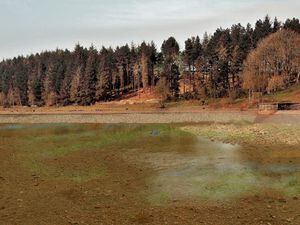Yorkshire Water gives glimpse of future impacts of climate change on reservoirs
Utility company has produced video and images of how reservoirs could look in the next 50 years without action to conserve water.

A water company has created a glimpse of how climate change could affect supplies in the future, to encourage people to save water.
Yorkshire Water has produced video and images of how some of its reservoirs could look in the next 50 years without action to conserve water.
The company predicts that it will have 100 million litres less in its daily supply by 2045.
The Environment Agency has predicted the UK could face water shortages in the next 25 years without action including companies tackling leakages, and efforts to reduce the amount customers use.
Yorkshire Water says it is trialling new technologies to find leaks more quickly, and customers can save water with simple steps such as turning off the tap while cleaning teeth, showering instead of having a bath and reducing car washing to only when necessary.

“We need to be careful with our water supply.
With the weather we experience in the UK it’s easy to think there’s enough to go round, but when you factor in the effects of climate change and population growth, there is a very real risk of water shortages by 2050.
“Every individual can make a difference; changing some of our daily habits can play a critical role in protecting our water resources.”

“Seeing what our reservoirs and environment could look like in 50 years’ time might be surprising and scary to some people, but the important thing to note is that it’s not too late for us to change that future.
Water leakage reduction plans and action by customers could make a real difference, she said.





